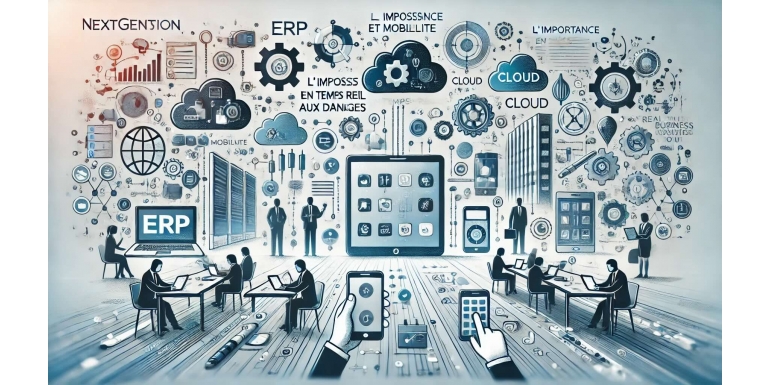
ERP and Mobility: The Importance of Real-Time Access to Data
In today’s business world, the ability to access real-time data from anywhere has become a necessity. With the rise of remote work, mobile teams, and the globalization of markets, companies must adapt to remain competitive. Integrating mobility into ERP (Enterprise Resource Planning) systems is now a crucial asset that allows businesses to stay agile, responsive, and efficient. This article explores in depth the importance of mobility in ERP systems and how real-time access to data can transform the way businesses operate.
1. What is Mobility in an ERP?
Mobility in an ERP refers to the ability of users to access ERP system features and data through mobile devices such as smartphones, tablets, and laptops. This includes accessing key business information, managing operational processes, and making real-time decisions, even when on the move.
-
24/7 Accessibility: With mobility, employees can access critical data at any time, regardless of their location, allowing for greater flexibility and responsiveness in managing operations.
-
Optimized User Interface: Mobile ERPs often come with simplified and intuitive user interfaces, designed for smaller screens of mobile devices, while maintaining the full functionality of the system.
2. Key Benefits of Real-Time Data Access via Mobile ERP
Real-time access to data via a mobile ERP offers numerous benefits that can transform business operations and enhance productivity.
-
Improved Decision-Making: Having access to real-time information allows decision-makers to make informed decisions quickly, which is essential in dynamic market environments.
-
Increased Productivity: Employees can manage their tasks without needing to be physically present at the office, resulting in increased productivity, especially for sales, service, and support teams who often work in the field.
-
Responsiveness to Changes: A mobile ERP allows instant responses to changes, whether it’s adjusting inventory, responding to an urgent customer request, or tracking real-time performance.
-
Enhanced Collaboration: Teams can collaborate more effectively by sharing information instantly, reducing communication delays and fostering more cohesive teamwork.
3. Use Cases of Mobility in ERPs
Mobility in ERPs finds applications in various functions and industries. Here are some concrete examples of how businesses are leveraging mobile ERPs.
-
Sales Force Management: Sales teams can access customer information, update sales opportunities, and manage orders in real time directly from the field.
-
Maintenance and Technical Support: Technicians can receive work orders, access maintenance histories, and report interventions in real time, improving service management and customer satisfaction.
-
Inventory Management: Warehouse managers can track inventory levels, validate receipts and shipments, and conduct inventories directly via a mobile device, ensuring more accurate and responsive inventory management.
-
Financial Tracking: Executives can monitor financial indicators, approve expenses, and access financial reports in real-time, enabling tighter financial control.
4. Challenges of Implementing Mobility in ERPs
While the benefits are numerous, integrating mobility into an ERP can pose some challenges that businesses need to overcome to succeed.
-
Data Security: Mobile access to ERP data potentially exposes the company to security risks, especially in cases of lost or stolen mobile devices. It is essential to implement robust security protocols such as two-factor authentication and data encryption.
-
Device Compatibility: Not all mobile devices are necessarily compatible with the existing ERP system. Companies need to ensure that their ERP is optimized to work on a variety of platforms and devices.
-
User Training: Employees need to be trained on using the mobile features of the ERP to maximize efficiency and avoid potential errors.
-
Deployment Costs: Integrating mobility into an ERP may require additional investments in software, hardware, and security. It is important to calculate the potential return on investment to justify these costs.
5. Future Trends: Mobility and ERP
As technology continues to advance, mobility in ERP systems is also evolving, with innovations that promise to make these systems even more powerful and accessible.
-
Integration of Artificial Intelligence (AI): AI can be integrated into mobile ERPs to provide predictive analytics, automate decision-making processes, and personalize user experiences based on behaviors and preferences.
-
5G Technology: With the deployment of 5G, mobile ERPs will benefit from faster connection speeds and reduced latency, improving the user experience and enabling even smoother real-time interactions.
-
Cloud-Based ERP: The growing adoption of cloud-based ERPs facilitates mobile access to data, offering greater flexibility and reducing infrastructure costs.
-
Improved User Experience: Mobile ERP user interfaces continue to improve, with more intuitive designs and enhanced features that make mobile use more efficient and enjoyable.
Conclusion: Mobility, an Indispensable Asset for Modern ERPs
Mobility has become an essential component of modern ERPs, enabling companies to access critical data in real-time and remain competitive in a constantly evolving market. By adopting a mobile ERP, businesses can not only enhance their responsiveness and productivity but also strengthen their agility and ability to make informed decisions, wherever they are. The key to success lies in thoughtful implementation, taking into account the challenges and capitalizing on the opportunities that mobile technology offers.
